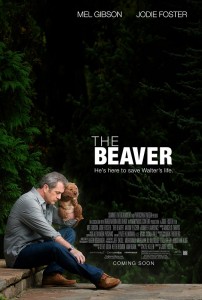 There’s a production design detail about mid-way through The Beaver that really struck me- as a recently reinvigorated Walter Black crawls back to the top of the CEO world and lands spreads on every magazine, an issue of WIRED sporting his face has the headline “The Future of Avatars.” It is here that a small hint of the kind of film The Beaver could have been is hidden– hidden in a more traditionally plotted Hollywood prestige film that is brave for its balance of light and dark, but disappointing for its muddled thematic payoff and confused understanding of depression.
There’s a production design detail about mid-way through The Beaver that really struck me- as a recently reinvigorated Walter Black crawls back to the top of the CEO world and lands spreads on every magazine, an issue of WIRED sporting his face has the headline “The Future of Avatars.” It is here that a small hint of the kind of film The Beaver could have been is hidden– hidden in a more traditionally plotted Hollywood prestige film that is brave for its balance of light and dark, but disappointing for its muddled thematic payoff and confused understanding of depression.
A narrated look at Walter Black’s life at the beginning of The Beaver explains that he is an inexplicably depressed man who has pushed away his family and professional life. He sleeps and mopes constantly for no real reason, and appears to be living in a walking coma. Once his wife is fed up enough to push him out of the house, he stumbles across a ratty old beaver puppet that he wears during a blown suicide-attempt. Afterward, the puppet becomes a way for Walter to bring out his inner energy again, and he constructs a farcical medical explanation for why he is living his life through his cockney puppet avatar.
First things first: Mel Gibson is categorically amazing. His real world problems are the elephant in his every scene, but really the character, other than a general dark depression, gives off few characteristics that can be connected with the Mel Gibson of the gossip columns without serious contextual gymnastics. Stripping away the real-world bullshit leaves a performance that manages to turn a character that is written as a cypher into a deep and rich presence in the film. That said, Gibson’s character is more of a force than a two-dimensional portrait of a man, and what insight the beaver personality gives us never coalesces into a fully detailed picture. Gibson’s attention to detail in his physical and vocal relationship with the puppet is just astounding though. It makes you wish he was on screen more often these days.
Gibson is backed by a superb supporting cast that includes director Jodie Foster, Jennifer Lawrence, and Anton Yelchin as Walter’s son Porter. This is where it’s important to note that The Beaver has a truly bifurcated plot-line: Porter’s story is of equal or even more prominence than his father’s. He’s a troubled young man who makes money in his high school by writing other people’s papers, but with a special skill for inhabiting their voice, and incrementally coaching their grades upward. When he’s approached by Jennifer Lawrence as the beautiful but complicated valedictorian that needs her graduation speech written, it starts a romance that ultimately ties into Walter’s tale, but is largely its own animal. Unfortunately the mirroring between the two is not necessarily great, and the clever moments in Porter’s storyline are dragged down by typically showy, unrealistic Hollywood symbols. There are several of those moments when characters do big, unrealistic things that are just a little too sanguine to be bought.
The comedy and drama balance is pretty stellar, with the film able to get a laugh whenever it thinks it’s right, but able to maintain dramatic surface tension despite the presence of a shitty-looking beaver puppet. There may be a key scene or two that suffers from the absurdity of the premise, and it will certainly cross the line for some viewers, but ultimately the film works and functions. This is largely due to Jodie Foster’s steady directorial hand and clear understanding of pacing and tonal tip-toeing. Unfortunately she’s hamstrung by a script that for all its hype leads toward two seemingly contradictory emotional resolutions that work well in that they are open containers for personal projection, but they aren’t definitive enough to hold much inherent value. It resembles a fortune cookie or a “psychic” that uses vaguely profound language so that it will mean something important to anyone with their own depressions and emotions to supply. It’s a good tack I suppose, since most of us have plenty we bring in with us.
Frankly, I don’t see how much can be taken away from The Beaver without first bringing much of your own baggage to it. The film is working with such big symbols and has to spend so much time making the two storylines progress believably that it rarely has time to push for the depth needed to make it special. Walter’s story in particular rises and falls in a very predictable fashion, before it’s cut off with baffling abruptness. Its pay-off is perhaps supposed to be reflected in his son’s journey, but it’s ultimately just unnecessarily enigmatic, and fails to do justice to Gibson’s incredible nuance. There’s a monologue towards the end that blatantly tries to sum up the film’s intentions, but the thematic ideas are pretty thin answers to the questions the film raises. The Beaver is a beautiful, delicate film, but it doesn’t know what it wants to say, so it ends up saying very little at all.
Rating: 




Out of a Possible 5 Stars
DISCUSS THIS on the CHUD Message Board
&
Like / Share it on Facebook (above or below) if you think it’s great!